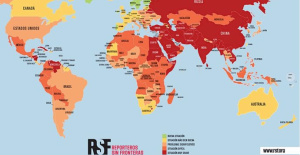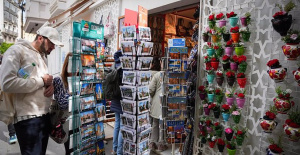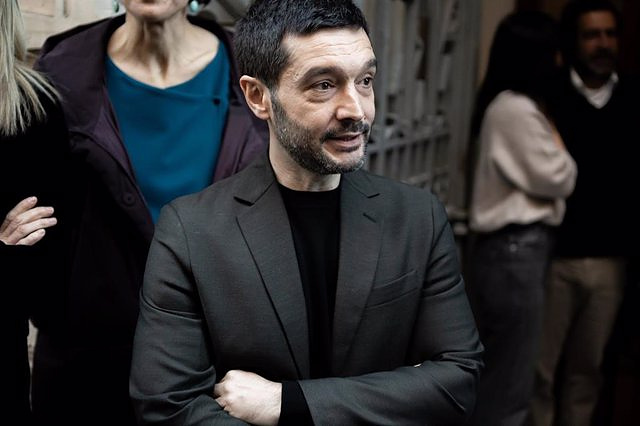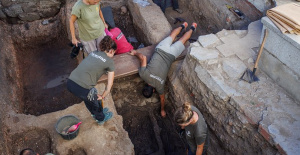It is expected that this aid will reach around 70,000 families and more than 100,000 people.
The Government has promoted this Tuesday, at the proposal of the Ministry of Social Rights, Consumption and Agenda 2030, a new model of wallet cards for families with children in situations of severe poverty, which replaces food baskets, "so that families do not have to go to the hunger lines". With this new system, the Executive plans to reach, starting next April 2024, some 70,000 families and more than 100,000 people.
"Today we take a decisive step to dignify social protection so that families with dependent sons and daughters do not have to go to the hunger lines," stressed the Minister of Social Rights, Consumption and Agenda 2030, Pablo Bustinduy, this Tuesday. , at the press conference after the Council of Ministers.
To this end, the Government approved this Tuesday, at the proposal of the Ministry of Social Rights, Consumption and Agenda 2030, a Royal Decree that will regulate a direct grant, on an exceptional basis and for humanitarian reasons, of a subsidy to the Spanish Red Cross to implement This wallet card program runs during the year 2024.
The maximum amount of the subsidy is 100.2 million euros (95.5 million are allocated to expenses on food and other basic products and 4.7 million to technical expenses for the implementation of the program) and will be implemented in the whole of the State.
As explained by ministerial sources, the Government will assume the management of these cards in a "temporary and exceptional" manner in 2024 and, as of January 1, 2025, the autonomous communities must be responsible for their management.
This decision has been made since there was a risk of not arriving on time, since the last food purchase was made last October 2023 and will last until next April 2024. On that date, deliver food baskets and the wallet cards must now be operational, according to the same sources.
With this new model, we go from physically providing food and hygiene products to delivering cards or vouchers redeemable in certain establishments, with the aim of "dignifying and normalizing" access to basic products by the most vulnerable families, so that They can decide based on their preferences, and thus also avoid the so-called 'hunger queues'.
LESS STIGMATIZING
"Today, from the Council of Ministers, we are promoting a change of model by which vulnerable families will be provided with wallet cards or vouchers exchangeable for food products and other essential products such as hygiene products in what will be a model less stigmatizing for families who will be able to buy these products directly in the supermarket," explained Bustinduy.
The purpose, according to the same sources, is that the supermarkets themselves can make the selection at the checkout, informing families of the products that can or cannot be loaded on the card.
As Bustinduy specified, this new model "will allow these families to directly access fresh products such as fruit and vegetables, which due to the nature of the previous bag distribution system was not a possible option."
"This change in model ultimately dignifies basic material assistance in our country, it will improve its functioning, it is specifically aimed at alleviating child poverty in Spain, it will improve the nutrition of the most vulnerable boys and girls and it will also have an impact in a higher quality of life for their families," remarked the Minister of Social Rights.
For this program, which is financed with the state section of the European Social Fund, the Government will allocate some 660 million euros for the next seven years - an amount "much higher" than the 3% required by the European Commission, according to what they say - and they expect it to benefit some 70,000 families. With the previous model, around 1.5 million bags of food were distributed.
These wallet cards will be aimed at families with dependent children, who earn less than 40% of the average income. The assessment and selection of the beneficiaries, as well as the delivery of the cards, will be the responsibility of the Social Services of each autonomous community.
"Regarding the estimate of beneficiaries, at the moment it is nothing more than an estimate, 70,000 families, and it will be through the social services of the autonomous communities when the demands for participation can be channeled and, therefore, have a more reliable orientation on the final number of recipients. We are moving with that estimate of 70,000 families, which in its varied composition will be above 100,000 people," Bustinduy specified.
FROM 130 TO 220 EUROS PER MONTH
By type of household, those made up of an adult and a minor will receive 130 euros per month; those for three people (two minors and one adult, or two adults and one minor), 160 euros; those with four people, 190 euros, and those made up of five or more members, 220 euros.
According to ministerial sources, these amounts are higher than what these families received through the delivery of food, since they calculate that they received 6 euros per person per month, an amount that, according to them, does not cover the care needs of a person.
The new wallet card will be rechargeable for a maximum of three months and, once that time has passed, families must recharge them again.
According to the same sources, this is a fund with limited resources that will not cover the needs of all families. In any case, they specify that this tool does not exclude other programs, actions or lines of financing.
With this new model, collaboration with the Spanish Federation of Food Banks (FESBAL) - which was in charge, together with the Red Cross, of delivering the food purchased by the Spanish Agrarian Guarantee Fund (FEGA) - will cease. However, the Ministry has specified that the food banks will continue to operate and receive public support.

 Exploring Cardano: Inner Workings and Advantages of this Cryptocurrency
Exploring Cardano: Inner Workings and Advantages of this Cryptocurrency Seville.- Economy.- Innova.- STSA inaugurates its new painting and sealing hangar in San Pablo, for 18 million
Seville.- Economy.- Innova.- STSA inaugurates its new painting and sealing hangar in San Pablo, for 18 million Innova.- More than 300 volunteers join the Andalucía Compromiso Digital network in one month to facilitate access to ICT
Innova.- More than 300 volunteers join the Andalucía Compromiso Digital network in one month to facilitate access to ICT Innova.-AMP.- Ayesa acquires 51% of Sadiel, which will create new technological engineering products and expand markets
Innova.-AMP.- Ayesa acquires 51% of Sadiel, which will create new technological engineering products and expand markets Spain moves from 36th to 30th place in RSF's world press freedom ranking but political pressure increases
Spain moves from 36th to 30th place in RSF's world press freedom ranking but political pressure increases Spain receives 16.1 million tourists until March and registers the best first quarter in history
Spain receives 16.1 million tourists until March and registers the best first quarter in history More than 2,000 arrested during pro-Palestinian protests at US universities
More than 2,000 arrested during pro-Palestinian protests at US universities Illa advocates for a "transversal" Government and Junts rules out agreeing with the socialists
Illa advocates for a "transversal" Government and Junts rules out agreeing with the socialists How Blockchain in being used to shape the future
How Blockchain in being used to shape the future Not just BTC and ETH: Here Are Some More Interesting Coins Worth Focusing on
Not just BTC and ETH: Here Are Some More Interesting Coins Worth Focusing on UPV students design an app that helps improve the ventilation of homes in the face of high temperatures
UPV students design an app that helps improve the ventilation of homes in the face of high temperatures Ivace and promotes a less invasive device for the early detection of prostate cancer
Ivace and promotes a less invasive device for the early detection of prostate cancer Valencia unanimously approves the ordinance to allocate spaces to test innovative initiatives
Valencia unanimously approves the ordinance to allocate spaces to test innovative initiatives UPV researchers promote a paid master's degree as a "talent factory" in integrated photonics
UPV researchers promote a paid master's degree as a "talent factory" in integrated photonics A million people demonstrate in France against Macron's pension reform
A million people demonstrate in France against Macron's pension reform Russia launches several missiles against "critical infrastructure" in the city of Zaporizhia
Russia launches several missiles against "critical infrastructure" in the city of Zaporizhia A "procession" remembers the dead of the Calabria shipwreck as bodies continue to wash up on the shore
A "procession" remembers the dead of the Calabria shipwreck as bodies continue to wash up on the shore Prison sentences handed down for three prominent Hong Kong pro-democracy activists
Prison sentences handed down for three prominent Hong Kong pro-democracy activists ETH continues to leave trading platforms, Ethereum balance on exchanges lowest in 3 years
ETH continues to leave trading platforms, Ethereum balance on exchanges lowest in 3 years Investors invest $450 million in Consensys, Ethereum incubator now valued at $7 billion
Investors invest $450 million in Consensys, Ethereum incubator now valued at $7 billion Alchemy Integrates Ethereum L2 Product Starknet to Enhance Web3 Scalability at a Price 100x Lower Than L1 Fees
Alchemy Integrates Ethereum L2 Product Starknet to Enhance Web3 Scalability at a Price 100x Lower Than L1 Fees Mining Report: Bitcoin's Electricity Consumption Declines by 25% in Q1 2022
Mining Report: Bitcoin's Electricity Consumption Declines by 25% in Q1 2022 Oil-to-Bitcoin Mining Firm Crusoe Energy Systems Raised $505 Million
Oil-to-Bitcoin Mining Firm Crusoe Energy Systems Raised $505 Million Microbt reveals the latest Bitcoin mining rigs -- Machines produce up to 126 TH/s with custom 5nm chip design
Microbt reveals the latest Bitcoin mining rigs -- Machines produce up to 126 TH/s with custom 5nm chip design Bitcoin's Mining Difficulty Hits a Lifetime High, With More Than 90% of BTC Supply Issued
Bitcoin's Mining Difficulty Hits a Lifetime High, With More Than 90% of BTC Supply Issued The Biggest Movers are Near, EOS, and RUNE during Friday's Selloff
The Biggest Movers are Near, EOS, and RUNE during Friday's Selloff Global Markets Spooked by a Hawkish Fed and Covid, Stocks and Crypto Gain After Musk Buys Twitter
Global Markets Spooked by a Hawkish Fed and Covid, Stocks and Crypto Gain After Musk Buys Twitter Bitso to offset carbon emissions from the Trading Platform's ERC20, ETH, and BTC Transactions
Bitso to offset carbon emissions from the Trading Platform's ERC20, ETH, and BTC Transactions Draftkings Announces 2022 College Hoops NFT Selection for March Madness
Draftkings Announces 2022 College Hoops NFT Selection for March Madness























